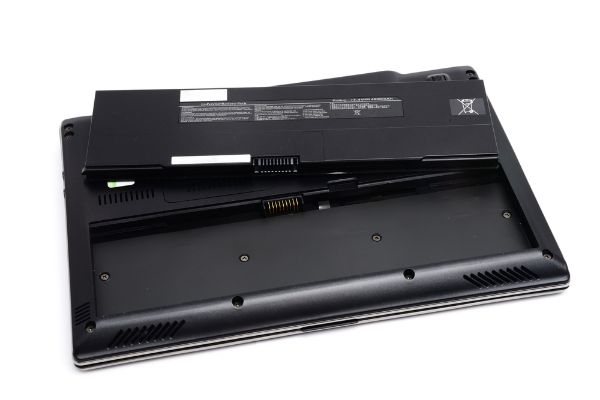Disclaimer: This post may contain affiliate links, meaning we get a small commission if you make a purchase through our links, at no cost to you. For more information, please visit our Disclaimer Page.
Developers all over the world make laptop computers as a compromise between the functionality of a desktop system and the portability you might need to have when you are out and about and need a computer quickly. As technology continues to improve, the gap between at least some laptop and desktop systems seems to shrink, too.
Certainly, there is no substitute for a high-end desktop, or one that you make with all the custom components that you like to see. However, many of the most recent laptops on the market are powerful enough to run several heavy applications at once without any issues.
In fact, you can even find semi-custom gaming laptops that manufacturers design with enough processing power to handle some modern, resource-intensive games for hours on end.
All of this power in portable form requires a battery, for the most part. Some laptop owners wonder if they might be able to use their computers even if a battery isn’t present inside the case. We can give readers an answer to this question in our article today. Additionally, we will dig deeper into whether it is okay to use a laptop computer without its battery, even if it is possible for you to do so.
As we move along, we’ll address some of the secondary possibilities of removing the battery, such as heat builds up, and we’ll take you through some general pros and cons of leaving the battery out of the laptop indefinitely.
Table of Contents
Can You Use a Laptop Without a Battery?
In most cases, yes, it should be possible to keep using a laptop without a battery. Most of the time, you will plug the laptop in when you need to charge the battery. Many people will leave their portable computers plugged in like this, drawing power off of the mains until they need to take the devices somewhere without a dedicated power source again.
When you use the laptop in this way, it bypasses the battery completely and treats the computer like a regular desktop rig.
If you have any interruption to this main power source, you will notice that your laptop will switch over to running off the battery immediately. It might make a beeping noise, and it should give you a message that flashes across your screen to let you know the power mode switched to the battery. If you have power-saving features active, you may notice that the display becomes less bright, and other things could happen behind the scenes to conserve battery power.
Because of the nature of laptops, it isn’t difficult to use them without a battery. However, there may be some exceptions to this rule. Some laptops have batteries that are simple to remove or replace whenever you might need to do so. Other models, while they still have batteries, do not necessarily have a design that promotes the easy removal of the battery pack.
For these kinds of laptops, battery removal is still possible, but it is less likely that an average user will do so themselves. Typically, it would require the complete dismantling or opening of the laptop to get at the battery. Further, you may need to remove or alter the placement of other parts to get at the battery. It would be important to put everything back properly once you are done.
Because of this kind of design, it might be true to say that some developers don’t mean for their laptops to run without any battery present. While you could still do this, it would take much more effort to take these portable computers apart and put them back together successfully.
It may be more accurate to say that, in practice, most laptops should run adequately without a battery, but not all of them should. However, most people prefer to use laptops that facilitate the easy and simple replacement of the battery, so we will focus on computers of that type in the rest of our article.
Is It OK To Run a Laptop Without Battery?
Yes, it should be perfectly fine to run a laptop when it does not have its battery present. However, this is like using it as a desktop system. That means that there are some extra precautions that you should take.
For example, you would need to make sure that it stays plugged into its adapter and outlet continuously. This is the same consideration you would have to give to any desktop rig that didn’t have the help of a backup or uninterruptible power supply.
Some people may even use laptops plugged into AC power that have batteries that are old enough that they hold no charge at all. Essentially, it would be the same difference if you removed the battery entirely.
In such cases, there is no reason not to remove the drained battery, but you should not see any performance issues if you leave it in, either. However, you would still want to be mindful of not jostling the plug when you are using the laptop in this way.
Furthermore, many people may move their laptops around out of habit, especially if they are used to using them without plugging them in first. It is best to avoid this practice if you use your computer without its battery.
If you try this, you may unplug it accidentally, or you could move it when the end of the cord is still inside the laptop’s port, possibly yanking out the cable and damaging it or the port.
Does Removing the Battery From a Laptop Reduce Heat?
Sometimes, removing the laptop battery can reduce any heating issues your laptop might experience. This is not true for all computers, and the answer can depend on how the manufacturer constructs the laptop.
It also has to do with the potential age of the battery itself. If the battery is not too old, it should be able to reach a full charge and stop.
When it is on AC power, the laptop should not use any of the energy stored in the battery. Therefore, the battery isn’t discharging, and that means that it should not be heating up as it is working.
However, batteries degrade over time as you use them. If your laptop’s battery is very old, it may no longer hold a full charge very well. In some cases, it may not be able to hold much of a charge at all when the unit is not drawing AC power.
When this kind of thing happens, you’re dealing with a battery that is constantly trying to charge itself. Even though it will not be able to reach a full charge, it will continue to try, and this can generate extra heat in the laptop. Removing such a battery, especially if you plan to use your laptop as a workstation, could reduce how much heat the unit puts out.
Even with new batteries, there is still the possibility of reducing heat. For most laptops, the battery itself acts as a sort of insulation layer that can trap more heat inside the case, and this is true even if the battery is not discharging.
Taking the battery out of your laptop could remove this layer, and that means that the system has more room to allow heat to escape, possibly cooling the whole unit even more than before. Because of the disadvantages of removing a laptop battery that we’ll cover in the next section, we recommend purchasing a usb laptop cooler.
What Are the Pros & Cons of Using a Laptop With No Battery?
Here are a few of the possible advantages of running a laptop without a battery:
1. If the battery no longer works, it won’t take up energy trying to charge itself all the time.
2. Should you have a new battery instead, this is a great way to keep it fresh. If you know that you will mostly use your laptop as a workstation that does not travel, you can save the new battery for the times when you know you’ll need a portable power source for your computer.
3. In rare cases, batteries can malfunction. If they do, there is a potential for them to leak or damage other parts of the system. Although most batteries should come without faults that might lead to this, you can take extra precautions by removing yours.
There could be a few downsides to using a laptop without a battery, too:
1. It will need a continuous power source. If the main source of power from the outlet fails, you may lose critical data. The chances of an accident happening with no battery increases. It can be as simple as unplugging the power source. If a power outage in your area occurs, you won’t be able to use your laptop if the main source of power comes from an outlet.
2. In addition to data loss, interruptions to the system could cause instability or the corruption of crucial system files. A battery offers at least some mitigation of this risk. More unexpected shut downs can also lead to other components being damaged.
3. Some laptop models may have settings that reduce system performance if there is no battery present. If you have such a laptop, it may be possible for you to override these restraints on the system manually, but it could take time.
With how severe the cons of having a no battery on your laptop, we recommend getting a new battery as soon as you can.
Conclusion
Most manufacturers intend for their laptops to run using a combination of both regular and battery power. However, almost all models you find on the market should be perfectly capable of performing their usual tasks without any battery inside them at all.
You’ll just want to make sure that the power source from the outlet stays constant. Furthermore, you should consider some kind of backup for your data, just in case there is any interruption. While there are some things to watch out for, removing the battery could help you keep new portable power sources fresh for a longer time, too.


